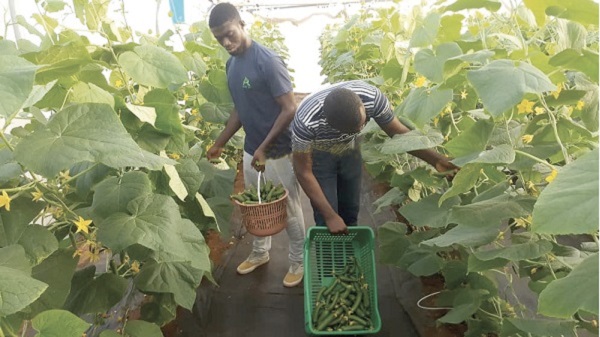
Harnessing digital technology for smart agric
The world is being increasingly connected as a result of digital technology. At smaller, faster, cheaper and more efficient way, mobile devices are being used.
Many businesses and farmers are receiving assistance in making more informed decisions. The farmers are being assisted in using more accurate amounts of water, fertilisers and maintain better control over their operations.
Digital technology
Digital technologies make easy many processes such as planning farming activities, budgeting, reporting and monitoring on multiple tasks and performances.
Digital technology is used in farm machinery, livestock handling facilities, agronomy, communication and other areas.
Agriculture is at the start of a new revolution, one in which data and connectivity will play a key role. Artificial intelligence, analytics, connected sensors and other advanced technologies have the potential to increase yields, enhance the efficiency of water and other inputs.
These can help in building sustainability and resilience across crop cultivation and animal husbandry.
Smart agriculture also includes the application of sensors, automation and robots in production systems.
Smart agriculture
Remote sensing data on soil conditions can help farmers manage their crops. Mobile phones lower the cost of information and improve farmers’ access to markets and financial assistance.
Entrepreneurs in Africa are interested in how farmers operate and how they may increase output.
The barrier to entry into farming technology has decreased as cloud computing, computing systems, connectivity, open-source software, and other digital tools are more affordable and accessible.
Farmers, investors and entrepreneurs can use digital technology to improve efficiency of food production and consumption in Africa.
From precision farming to a more efficient food supply chain, technology has the potential to bring major economic, social and environmental benefits.
Smart agriculture involves the application of digital technology to integrate agricultural production from the paddock to the costumer.
Agricultural industries can benefit from these technologies by adopting more digital tools and information to make better decisions and increase productivity
In rural areas of developing countries where majority of people rely on agriculture for their living, digital technology can assist in overcoming global poverty and hunger more quickly.
In smart agriculture, farmers use mobile phones and other technologies that could revolutionise for the communities to secure and improve their livelihoods.
It is required for more productive, efficient, sustainable, inclusive, transparent and resilient food systems for achieving the UN Sustainable Development Goal of a world with zero hunger by 2030.
Indoor vertical farming has the potential to increase crop yields, overcome land constraints and shorten supply chain distances.
Vertical farms use up to 70 per cent less water than traditional farms. Mobile phones are at the top of the list of digital technologies revolutionising agriculture.
Mobile phones
Many rural people’s lives, including the small-scale farmers, have been revolutionised by mobile phones.
Farmers may access solutions such as advisory services that offer ideas on raising outputs, keeping livestock healthy and up-to-date weather information even if they do not have access to mobile internet.
Farmers may even access wider choice of high-tech solutions via smart phone applications which can diagnose ailing crops and recommend remedies for many types of pests, diseases and nutrient deficiencies.
Precision agriculture technologies are transforming the face of modern farming. Digital advancements such as wireless communication, data analytics, and data-driven genome editing are rapidly being applied in agriculture as they provide more accuracy in decision making and practice.
Farm equipment is connected to software platforms that track on-farm data and enable analysis of soil and climate conditions.
Disadvantages
One of the downsides of agriculture technology is its high maintenance costs. The hefty maintenance costs of the technology make it tough for small enterprises and farmers to handle.
The majority of technical machinery and devices pollute our environment which is extremely detrimental to humans.
Tractors, trucks and a variety of other large machinery are overused, resulting in harmful chemical fumes and carbon dioxide in our environment.
Fertiliser and pesticide use generate a slew of issues. Fertilisers and insecticides are good for the health and output of plants.
However, it has a number of negative consequences for plants and other living beings. The majority of farmers are illiterate and understanding how to use current technologies in farming is challenging.
Excessive use of technology in the fields depletes the soil’s fertility. One of the most serious drawbacks of technology in agriculture is that, it diminishes soil fertility.
Overuse of fertilisers and pesticides have been proven in several studies to have negative health consequences.
Overuse of pesticides have the disadvantage of killing soil organisms that are helpful to the plant and aid in its growth.

The writer
Policy recommendations
Firstly, the government must propose digital agriculture as a national agenda backed by an act, this act should contain all rules and regulatory framework on digital governance where the Ministry of Food and Agriculture would enforce them.
Secondly, instituting education and training programmes to all actors across the value chain and to empower farmers on digital tools.
Additionally, public and private organisations should increase investment in digital infrastructure in the country.
Lastly, the government should adopt suitable digital technology tools and innovations that would meet local needs.
The writer is the Registrar, Chartered Institute of Agriculture, Ghana
Email:
